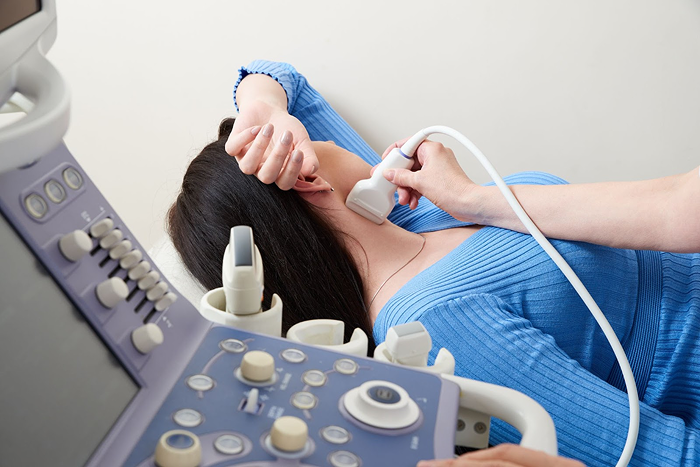Edit Content
What Happens if You Don’t Drink Enough Water Before Ultrasound?
When you’re scheduled for an ultrasound, especially of the abdominal or pelvic area, drinking water beforehand is one of the most crucial steps for preparation. Hydration before your ultrasound not only helps create high-quality images but also aids in a smoother and faster experience. Here’s why water is so essential for ultrasound imaging and what can happen if you don’t drink enough water before your scan.
Why Hydration Matters for Ultrasound Imaging?
Water is essential in ultrasound imaging because it acts as a natural conductor for sound waves. Ultrasound relies on sound waves to create images, and these waves travel through fluids much more effectively than through air. When you drink water before your ultrasound, a full bladder gently shifts your intestines and other tissues out of the way, creating a clear path to the pelvic and abdominal organs like the uterus, ovaries, and bladder. A well-hydrated body creates an optimal environment for ultrasound waves, improving the accuracy and clarity of the images.
Inadequate hydration can compromise the results of pelvic ultrasounds, as sound waves may have difficulty passing through the body and reaching the intended area. Clear images allow healthcare professionals to properly assess conditions, evaluate symptoms, or diagnose any underlying issues. Drinking enough water prior to the exam is essential, as it sets the stage for accurate and reliable results.
What Happens if You Don’t Drink Enough Water?
If you don’t drink enough water before your ultrasound, several potential issues could impact the exam:
Get in touch with us!
1. Compromised Image Quality
Without a full bladder, your technician may struggle to capture sharp images. Insufficient water intake can lead to poor image quality that prevents our team from getting a full view of the organs or structures we need to evaluate. This can be particularly challenging in pelvic scans, where a full bladder helps separate pelvic organs for better visualization.
2. Longer Exam Time and Extra Pressure
When the bladder is not sufficiently full, ultrasound technicians may have to apply additional pressure or adjust the transducer multiple times to try and obtain a clearer view. This can make the process longer, requiring extra steps and adjustments that may be slightly uncomfortable for the patient.
2. Possible Need for Rescheduling
In cases where imaging quality remains inadequate despite the technician’s best efforts, you may need to reschedule the exam. Rescheduling can cause delays in your diagnosis and treatment, especially if your ultrasound is needed urgently.
5. Inaccurate or Delayed Diagnosis
High-quality imaging is critical for accurate diagnoses. Poor hydration may limit the clarity of the scan, affecting the interpretation of any findings. This is especially concerning for individuals undergoing an ultrasound to monitor a specific health condition or check symptoms, as an unclear image could lead to an incomplete assessment.
How Much Water Should You Drink Before an Ultrasound?
For optimal results, most patients are advised to drink approximately 32 ounces (or about 1 liter) of water within the hour before their ultrasound appointment. However, the exact amount and timing may vary depending on the type of ultrasound and the specific area being examined. Our team will provide detailed instructions specific to your appointment, so you know how much water to drink and when to start drinking it to ensure your bladder is comfortably full.

If you have specific hydration needs or health conditions, such as bladder sensitivity or a tendency to experience discomfort with a full bladder, please let our team know. We are here to adjust the instructions as needed to make your experience as comfortable as possible.
Common Questions About Hydration and Ultrasound Preparation
While staying hydrated is important, it’s also essential not to overdo it. Drinking too much water in a short period can cause discomfort and excessive bladder filling. If you’re feeling overfull, you may experience discomfort during the exam. Instead, try to drink the recommended amount steadily over the hour before your appointment, so your bladder is full but not uncomfortable.
The purpose of a full bladder is to create a clear view of the pelvic organs. In pelvic scans, a full bladder shifts the intestines and other organs out of the way, making it easier to see structures like the uterus and ovaries. This isn’t necessary for all types of ultrasounds, such as musculoskeletal scans, as they involve imaging of more superficial or less obstructed areas.
If drinking the recommended amount feels challenging, start slowly and drink water at a steady pace. Avoid caffeine or other diuretics that may cause frequent urination. If you have any medical concerns related to hydration, contact us in advance so we can offer guidance and possibly adjust preparation instructions.
Tips for a Comfortable and Effective Preparation
- Start Hydrating Early: To prevent discomfort, it’s best to start drinking water early. Begin about an hour before your appointment and sip water consistently, rather than drinking it all at once. This approach helps fill your bladder gradually and can make the experience more comfortable.
- Avoid Diuretics: Stick to plain water, avoiding caffeine and sugary drinks, which can act as diuretics and lead to faster bladder emptying. Diuretics cause the body to expel more fluids, which can make it harder to maintain the full bladder necessary for a successful ultrasound.
- Plan Your Arrival Accordingly: To avoid discomfort, plan to arrive close to your appointment time. Some patients find that waiting too long with a full bladder can be uncomfortable, so we do our best to keep you on schedule.
Contact Us to Learn More
At Fairbanks Ultrasound, we’re committed to making sure every patient has a positive and informative ultrasound experience. If you have additional questions about preparation, hydration, or any other aspect of your ultrasound, reach out to us directly. Our team is here to provide the information you need, ensuring you’re fully prepared for your scan and can get the most accurate results possible.

Same-Day Walk-Ins Available
At Fairbanks Ultrasound, we proudly welcome same-day walk-ins with a valid referral or imaging order from your provider. This flexibility allows us to accommodate time-sensitive exams and patients who need faster access than traditional hospital scheduling often permits. Whether you’re facing an urgent need or simply prefer quicker service, our team is here to provide prompt, high-quality imaging when you need it most.
Do you need help right away?
No problem! Call Us Now.
Fairbanks Ultrasound is a local center in Fairbanks, Alaska that offers various ultrasound services for pregnancy, gynecology, thyroid, vascular, and general purposes.

